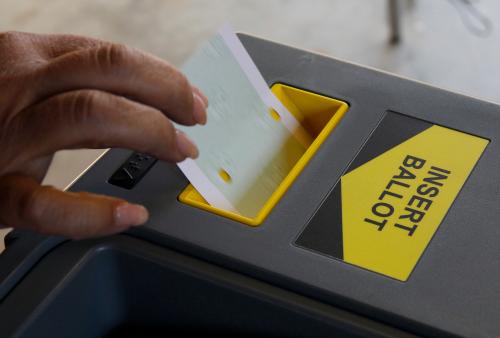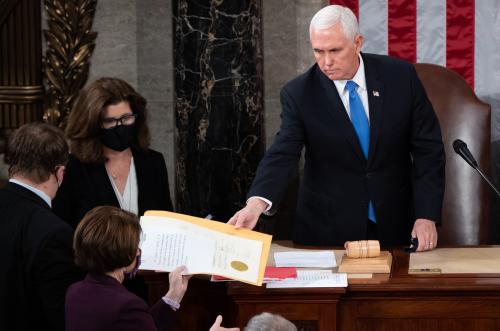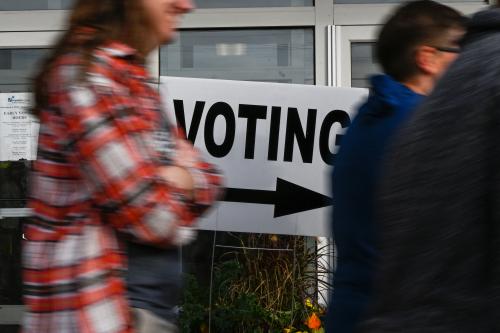This is Part 6 of a series which will take an in depth look at election deniers in the 2022 midterms in an effort to assess their likelihood of success, their plans if elected, and their impact on election administration and democracy.
The recent election was very bad for the election denier movement, and the election of Katie Hobbs as governor of Arizona completed the bad news. Hobbs was the last in a long line of governors and state elected officials who held the line against people who, like their leader Donald Trump, believed that there was massive corruption in the 2020 election. In the years since, they believed that by “fixing” the system, Trump could win in 2024. By sowing unfounded doubt about election administration in many places, they created a threat to democracy.
In a recent post, we identified 345 candidates running on a platform of election denial. The count includes statewide elected officials, candidates for the House and Senate, and state legislative candidates. The inclusion of state legislative candidates makes our count somewhat higher than others.
Overall, 226 election deniers or 66% won their races. However, this figure probably overestimates the impact of the election denier movement for two reasons. It includes 132 congressional candidates, 113 of them were incumbents who always have high win rates. Some of these incumbents were MAGA-style incumbents from deep red districts who had given some sort of support to Trump’s “big lie” about the election. That support ranged from voting against Biden in the 2020 electoral college vote, to a declaration that Biden was an illegitimate president, to milder statements about the need to ensure election integrity. They could have some influence in the House in the next presidential election, which is why we have previously written about the need to tighten federal law governing the recognition of presidential electors, including by Congress.
However, election administration is overwhelmingly a state, not a federal responsibility. So, when it comes to election administration, the most important offices are the three statewide offices: secretary of state, governor and attorney general. In most states the secretary of state has control over elections—although in some states, such as Pennsylvania and Maryland for instance, the governor appoints the person in charge of elections, and thus the governor’s views are critical too. That is true not only in those states but also more generally because of the powers of the state chief executive’s office. And the attorney general typically has an important role in enforcing the laws in the state, including those regarding elections (as well as advising the governor and the secretary on some election issues in a number of states).
Secretary of State races
Of the candidates running for secretary of state, 12 were election deniers. To date the winners are Wes Allen in Alabama, Diego Morales in Indiana[1], and Chuck Gray in Wyoming (who ran uncontested). Election deniers lost their races for secretary of state in nine states, Arizona, Connecticut, Massachusetts, Michigan, Minnesota, Nevada, North Dakota, New Mexico and Vermont.
Gubernatorial races
There were 23 election deniers running for governor of their state. Fourteen lost their races, seven won their races and there is a race in Alaska still to be decided that features two deniers of the same party. Of the 14 losses for election denial, perhaps the most spectacular was the outcome of the hotly contested race in Arizona. Election denial was front-and-center in the race and on the ballot and was rejected. While it was a close race, it appears to have been a resounding defeat for the denial movement.
Attorney General races
And among the 10 races for attorney general, candidates in Nevada, Maryland and Michigan lost their bids for office and six candidates won their bids. The Arizona attorney general race is still up in the air with the final ballots left to count. The non-election denying candidate is in the lead, but that margin has been dwindling as increasingly redder daily counts come in. The last batches of ballots are expected to be bluer, both based on the geography from which they are coming and because they will include more cured and provisional ballots which tend to favor Democrats. The race looks headed for an automatic recount under Arizona’s standard of a race that ends within .5% of the total vote. However that race turns out, even if the election denier wins, he will be sandwiched between a non-election denying governor and secretary of state who have the primary power over elections under Arizona law and can make sure those contests proceed under regular order.
All in all, the statistics for election deniers are far worse when it comes to swing states. Almost all of the successes were in red or deep red states. In purple places, including Michigan and Wisconsin, (not to mention blue ones) the election deniers running for statewide office were wiped out, with the sole remaining undetermined attorney general race in Arizona.
Finally, among the 96 candidates for state legislative offices that we were able to identify as election deniers, 71 or about 74% have won their races, although about 15 races were still to be called as of this writing. These offices are important because in many states the changes election deniers would like to make require state legislative action.
So, what are we to make of these numbers? First of all, not all election deniers are equal. The statewide offices, and secondarily, the state legislators, have more power to affect election administration than do members of Congress. And the prospect of election deniers in office is much more dangerous in swing states than in deeply red or deeply blue states, which is why the election denier movement, while not limited to swing states, had its greatest appeal among Trump’s followers in states where the 2020 presidential election was close. Following his loss in the 2020 election, Donald Trump fought hard to create doubts about the vote in an effort to affect the choice of electors and the Congress—which is why passage of the Electoral Count Act is so important.
Turning to the states, let’s start with Arizona, ground zero for election deniers. In 2020, Biden won it with a mere .3% of the vote, creating a frenzy of conspiracy theories. Arizona is the state where deniers searched for bamboo fibers in ballots that had supposedly been dropped into Phoenix by the Chinese. It is also the state where a non-governmental, privately funded recount ended up finding even more votes for Joe Biden. None of this—not the absence of fibers nor the result of a second count dampened the enthusiasm of candidates for governor, secretary of state and attorney general—all of whom campaigned vigorously on the “big lie.” The Republican candidate for secretary of state, Mark Finchem, who was a national leader in the election denier movement and who was present at the January 6 riot at the Capitol, lost to Adrian Fontes by five percentage points. As noted, the election denier candidate for governor lost narrowly and the candidate for attorney general is trailing his Democratic opponent.
In another critical swing state, Michigan, which Biden won by only 2.8% of the vote, all three election deniers at the top of the ticket were defeated. Some such as Tudor Dixon who ran against Governor Whitmer, were defeated handily, losing by over 10%. In addition, Democrats took control of both houses of the state legislature where eight out of 33 election deniers lost their seats. This clean sweep in a key swing state dealt a serious blow to the hopes of election deniers.
In Nevada, where Biden won by 2.4%, election denier Sigal Chattah lost her race for attorney general by more than 7%. The race for secretary of state was closer with election denier Jim Marchant losing to Francisco Aguilar by 2.2%. However, the Republican candidate for governor, Joe Lombardo, won his race narrowly. Although Lombardo was endorsed by Trump and was concerned about “election integrity” he never went as far as most other election deniers. In his debate, he said that election irregularities were not enough to have changed the outcome of the 2020 election.
In Georgia, which Biden won by a mere .2%, the two officials most responsible for certifying the election; Gov. Kemp and Secretary of State Raffensperger, refused to go along with Trump’s now famous demand that he “find” more votes. In spite of the vitriol Trump spewed their way, they each beat Trump-backed candidates in their primaries and won re-election handily—Kemp by 7.5% and Raffensperger by almost 10%. Even more important is that by breaking with the “big lie” early on, these two candidates did very well against their Democratic opponents.
Election deniers did not do well on Election Day; in fact, in some states that stance seemed to hurt them and perhaps others on their tickets. The next challenge in this series is to see whether or not there was a “denier drag” operating in the 2020 midterms. Did the adoption of this position by high profile Republicans hurt the chances of other Republicans on the ballot? When the votes are all in, we will turn to that question.
[1] Secretary of state Morales joined the America First Secretary of State Coalition which endorsed Trump’s claims of voter fraud in 2020.








Commentary
Democracy on the ballot—Hobbs finishes off election denial (for now)
November 15, 2022